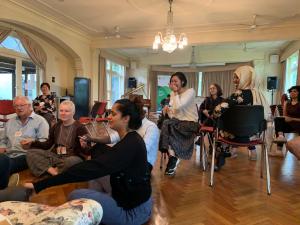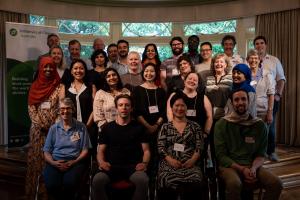A chance to re-set
‘Recalibrating my life’ was how one participant described their experience of the November 2019 Life Matters workshop.
Structured as a personal retreat for people or all faiths, or none, Life Matters has no ‘agenda’ for participants, but rather offers a platform for each to find the inspiration and energy they need to take the next step in life. Participants and faculty come together to co-create a space in which personal stories can be heard in a safe, non-judgmental environment. Workshops usually take place over a long weekend, with participants working through a sequence of activities designed to create the space and time for them to reconsider, and perhaps re-set, their life paths.
 Times of quiet and silence to discern the inner voice of conscience and wisdom alternate with talks by panelists, group discussions and times for rest and creativity.
Times of quiet and silence to discern the inner voice of conscience and wisdom alternate with talks by panelists, group discussions and times for rest and creativity.  Towards the end of the weekend, a session on ‘Goals, Choices, and Decisions’ offers everyone a chance to speak about changes they have decided to make, and new areas of learning that they have experienced.
Towards the end of the weekend, a session on ‘Goals, Choices, and Decisions’ offers everyone a chance to speak about changes they have decided to make, and new areas of learning that they have experienced.
‘Of the 16 people who took part this time, several spoke of commitments they have now made to themselves, their families, and the wider community,’ said facilitator Rob Wood, who has co-managed the workshops for over three decades.
New decisions, new directions
Some of the decisions that participants chose to share in the workshop included:
- seeking to restore and heal certain negative relationships in their personal life;
- trusting one’s own ‘gut feeling’ as a way to avoid getting lost;
- discarding excessive guilt about not filling every moment of the day with activity; and
- acting on a sense of calling to develop personal relationships with Indigenous Australians.
Life Matters alumni often serve at subsequent workshops as faculty and support crew. Many welcome the ongoing involvement and enjoy working with others on a peer-to-peer level: sometimes, faculty make new decisions themselves, inspired by others in the group.
‘Here, my silent time gave clarity … so I can nourish myself,’ said one participant, at the close.
Intergenerational dialogue
The November workshop was the first to take place since the organizing team made a decision to end the practice of specifying age cohorts. Once divided into under-35 and over-35 age groups, the group this time included participants aged 22 to 75 years old.
IofC programs often support intergenerational dialogue. A feature of this particular group was the presence of a whole family in which father and son, who had taken part in Life Matters before, served as faculty, while mother and daughter came as participants.
A key aspect of Life Matters workshops is the building of an interim community of friends and supporters who may provoke and validate commitments. Rob noted that participants communicated well across the generations. ‘It seems that, the more that’s risked, the more that’s gained in terms of trust established at the heart of these groups,’ he observed.
And while another workshop comes to a close, for participants, he said, ‘The Life Matters journey, inner and outer, is just beginning.’

Life Matters workshops take place through the year. In 2020, there will be workshops in March and November in Melbourne, as well as workshops in other cities in Australia. For more information, contact Rob Wood


